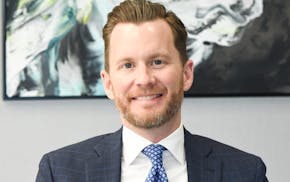U.S. marshals seized more than 80 cases of "probiotic" products Tuesday from UAS Laboratories in Eden Prairie, alleging that the firm flouted previous warnings from the U.S. Food and Drug Administration and made claims of unproven medical benefits.
The company manufactures and markets probiotic products, which deliver what some call "good" bacteria to the gut. Such microorganisms are believed to be healthful for their host.
UAS President Sita K. Dash denied mislabeling his products and said Tuesday that the firm is working with the FDA to resolve the dispute.
"The first thing we want our customers to know is that our products are safe and effective and they need not worry about the probiotics they are taking. That is not at issue with the FDA," the company said in a statement.
"What is at issue with FDA are statements made on our website that FDA believes expand our labeling and make 'drug-like' claims for our probiotics. So like nutritional supplements, we cannot make claims beyond describing general health benefits even though the medical and scientific literature may be suggestive of certain more specific health benefits."
Dash founded UAS in 1979 after spending six years with the South Dakota Department of Agriculture's food and drug division, where he rose to become its director.
The FDA warned Dash in May 2005 that an inspection had found "serious" labeling violations for a number of UAS probiotics. The company had claimed that some could inhibit ulcers, protect against E. coli and salmonella infections, reduce vaginal and yeast infections, promote the body's cancer-fighting activities, reduce cholesterol and help prevent rotoviral diarrhea.
Websites ranging from the Mayo Clinic to the World Health Organization and Harvard and Tufts universities have cited research indicating similar findings about certain probiotic products. But linking such claims to specific products triggers regulatory oversight, said Siobahn DeLancey, an FDA spokeswoman.
"As soon as a product claims to treat or prevent or cure or mitigate a disease, that is what FDA considers a drug claim, and that automatically means it needs to be the subject of a new drug application," DeLancey said. Nutritional products can make general claims about such things as supporting immunity or cell functions, she said. "But they can't say things like, cures cancer or treats a urinary tract infection."
In 2005, UAS had promised to correct its labeling to comply with federal law, and appeared to have done so, according to the FDA's forfeiture complaint, which was filed in Minneapolis June 1 and unsealed Monday. But FDA inspectors discovered in March that UAS was making claims on two websites -- uaslabs.com and wholeapproach.com -- that were similar to the claims it had been warned against, the complaint says.
UAS claimed that its products could prevent colds, flu, ulcers, high cholesterol and respiratory, urinary tract and yeast infections, the FDA said. Although the agency notified the company about its findings, UAS still hadn't removed the medical claims as of mid-May, the complaint said.
The company's attorney, Mark DuVal, said UAS wanted to comply. He read a reporter two e-mails that the company sent in late March to Tyra Wisecup, an FDA compliance officer, asking her to meet and identify what the agency found objectionable so that it could be removed.
Wisecup responded on March 31 that she would not meet until a review of the FDA's inspection had been completed, DuVal said. "And then, boom! They get two federal marshals at their front door with six other FDA employees."
The company's statement says, "While we respect the FDA's position, we feel this matter could have been resolved with a phone call or even a warning letter."
Dash, originally from Orrissa, India, was given an award by the India Association of Minnesota in 2009 recognizing his "innovations in science and technology, dedicated service to community, outstanding social and philanthropic activities and leadership."
Dan Browning • 612-673-4493

